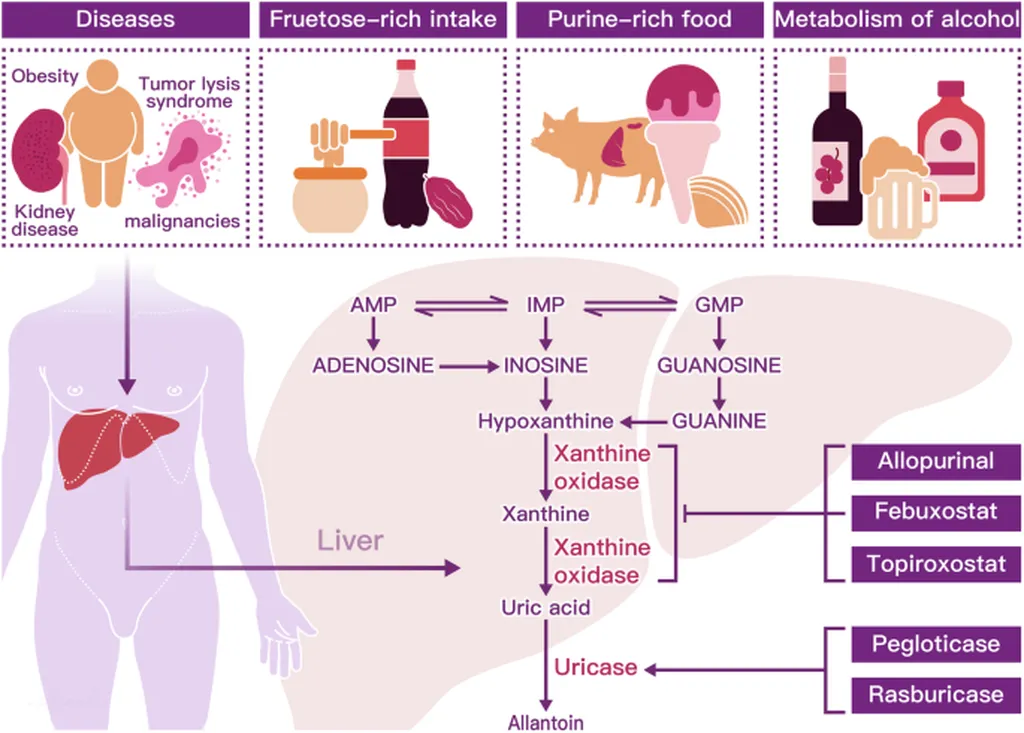In the quest to combat the rising tide of hyperuricemia (HUA) and gout, a groundbreaking review published in *Food Science and Human Wellness* (which translates to *Food Science and Human Wellness*) has shed light on an unexpected ally: the gut microbiota. Led by Feiyan Zhao of the Inner Mongolia Agricultural University, the research delves into the intricate relationship between gut bacteria and uric acid metabolism, offering a promising avenue for treatment that could reshape the future of managing these debilitating conditions.
Modern lifestyles and diets have contributed to a surge in HUA and gout, placing a significant economic burden on individuals, families, and society. Traditional treatments often fall short, leaving patients in search of more effective solutions. Zhao’s review highlights the gut microbiota as a potential game-changer, with the power to influence uric acid metabolism and alleviate symptoms.
The gut microbiota, a complex ecosystem of microorganisms residing in the digestive tract, plays a crucial role in regulating uric acid levels. “The gut microbiota is not just a passive bystander in uric acid metabolism,” Zhao explains. “It actively participates in the process, making it a prime target for therapeutic intervention.”
The review summarizes the unique gut microbiota features observed in subjects with HUA and gout, revealing distinct differences compared to healthy individuals. Moreover, it explores the therapeutic effects of microecological therapies, such as probiotics, prebiotics, and fecal microbiota transplants, which aim to modulate the gut microbiota and its downstream metabolism.
Probiotics, often referred to as “good” bacteria, have shown promise in reducing inflammation and lowering uric acid levels. Prebiotics, on the other hand, serve as food for these beneficial bacteria, promoting their growth and activity. Fecal microbiota transplants, while more invasive, offer a comprehensive approach to restoring a healthy gut microbiota.
“The current evidence is compelling,” Zhao notes. “These strategies are safe and show great potential in alleviating inflammation, reducing uric acid, and restoring a healthy gut microbiota in subjects with uric acid metabolism-related diseases.”
However, the review also highlights the need for further research. While animal studies have generated encouraging results, rigorous human intervention trials are essential to evaluate the therapeutic effects of microecological therapies in managing HUA and gout.
The implications of this research extend beyond individual health, with significant commercial impacts for the energy sector. As the understanding of the gut microbiota’s role in uric acid metabolism deepens, new opportunities for developing targeted therapies and functional foods are likely to emerge. This could lead to innovative products that not only improve patient outcomes but also create new markets and revenue streams.
In the meantime, the review serves as a call to action for the scientific community. “We propose that vigorous human intervention trials should be conducted in the future to evaluate the therapeutic effects of microecological therapies in managing HUA and gout,” Zhao concludes.
As the field of gut microbiota research continues to evolve, the insights gleaned from this review could pave the way for a new era in the treatment of HUA and gout, offering hope to millions of patients worldwide. The journey towards a healthier gut—and a healthier future—has only just begun.

